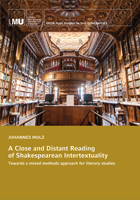A Close and Distant Reading of Shakespearean Intertextuality: Towards a Mixed Method Approach for Literary Studies
Synopsis
This study is an attempt at tracing and understanding Shakespearean intertextuality with the help of both qualitative and quantitative methods. The author looks for (near-)verbatim quotations of Shakespeare’s works in contemporary British novels. The references cited help to answer how Shakespeare is referenced by those who came after him and how text mining and computational methods can facilitate the search for these references.
The present study looks for salient patterns in Shakespearean intertextuality in a manual, qualitative examination of the complete prose works of 11 authors in a corpus of 14 million words. A second, quantitative reading of digitalised versions of the texts allows for a significant extension of the corpora and a comparison of the methods involved.
The quantitative part of this study mirrors the qualitative part with methods provided by the ever-emerging Digital Humanities. The findings of both approaches are juxtaposed, and problems and possible solutions are discussed, in order to expand the methodological toolbox of intertextuality studies.
This book is also available in print.
Research data for this publication can be accessed on Open Data LMU: https://doi.org/10.5282/ubm/data.177
Downloads

Published
Categories
License
Copyright (c) 2020 Open Publishing in the Humanities

This work is licensed under a Creative Commons Attribution 4.0 International License.

